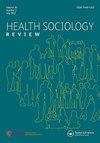Social disparities producing health inequities and shaping sickle cell disorder in Brazil
IF 2.5
2区 医学
Q2 HEALTH POLICY & SERVICES
引用次数: 5
Abstract
ABSTRACT Sickle cell disorder (SCD) is a severe recessive genetic condition manifesting in several complex forms. It is a cause of high mortality rates across the world, affecting predominantly non-white populations. This article aims to discuss how persistent social disparities and health inequalities in the Brazilian context can produce negative effects in lifelong conditions such as Sickle Cell Disorder. Appearing usually in the patient’s first year of life, when not treated, SCD may lead to several life threatening complications and impact on a person’s quality of life. In order to understand the link between health and social circumstances, it is important to consider the socio-economic transformation of Brazilian society over time, as well as cultural and historical aspects of the country. The concept of inequity will ground this analysis, facilitating an understanding of the process of producing an extra burden for people with SCD as a result of social disparities, including the existence of racism.巴西的社会差距造成卫生不平等并形成镰状细胞病
镰状细胞病(SCD)是一种严重的隐性遗传病,表现为多种复杂形式。它是世界各地高死亡率的原因,主要影响非白人人口。本文旨在讨论巴西背景下持续存在的社会差异和健康不平等如何对镰状细胞病等终身疾病产生负面影响。SCD通常出现在患者生命的第一年,如果不治疗,可能会导致几种危及生命的并发症,并影响患者的生活质量。为了理解健康与社会环境之间的联系,重要的是要考虑巴西社会随着时间的推移所发生的社会经济转型,以及该国的文化和历史方面。不公平的概念将为这一分析奠定基础,有助于理解由于社会差异,包括种族主义的存在,给SCD患者带来额外负担的过程。
本文章由计算机程序翻译,如有差异,请以英文原文为准。
求助全文
约1分钟内获得全文
求助全文
来源期刊

Health Sociology Review
Multiple-
CiteScore
7.50
自引率
0.00%
发文量
14
期刊介绍:
An international, scholarly peer-reviewed journal, Health Sociology Review explores the contribution of sociology and sociological research methods to understanding health and illness; to health policy, promotion and practice; and to equity, social justice, social policy and social work. Health Sociology Review is published in association with The Australian Sociological Association (TASA) under the editorship of Eileen Willis. Health Sociology Review publishes original theoretical and research articles, literature reviews, special issues, symposia, commentaries and book reviews.
 求助内容:
求助内容: 应助结果提醒方式:
应助结果提醒方式:


